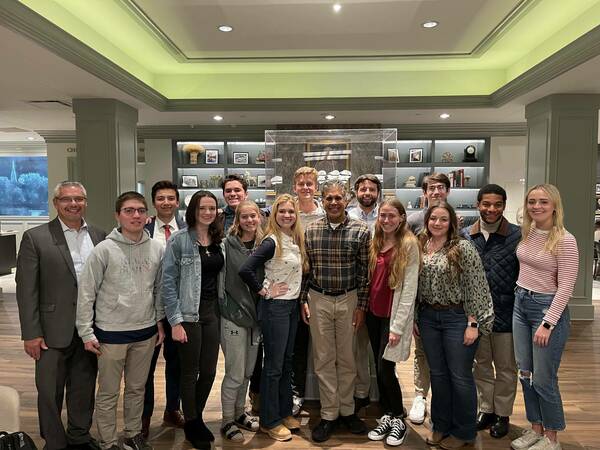
This fall, fifteen undergraduates gathered with Judge Amul Thapar and CCCG Director Vincent Phillip Muñoz for two hours over five Tuesday evenings for a one-credit class titled “Church, State, and the American Supreme Court.” Co-taught by Muñoz and Judge Thapar, who sits on the United States Sixth Circuit Court of Appeals, the class explored First Amendment jurisprudence and philosophies of religious liberty.
“One credit allows us to really focus on one issue and get to the heart of it,” Judge Thapar said. Thapar was nominated to the appellate court by President Donald Trump in 2017. Previously, he served as the United States Attorney for the Eastern District of Kentucky. He received his undergraduate degree from Boston College and his law degree from the University of California, Berkeley.
In the class, students read landmark Supreme Court decisions and explored prominent debates in religious liberty jurisprudence. Students were challenged to form their own views on these debates by evaluating Supreme Court opinions.
The class began with an exploration of the philosophical foundations of religious liberty in both American political thought and Catholic teaching. Then, in subsequent classes, students discussed the First Amendment in light of competing understandings of the role of the judge, grappling with the debates over originalism and judicial activism as applied to the law.
“I was excited to take the class because it allowed me to explore my passion for religious liberty in the context of the Supreme Court and the U.S. Constitution, with the unparalleled opportunity of learning directly from an expert of the field in Judge Thapar,” said Corrinne Carlson, a senior Menard Family Tocqueville Fellow.
“I learned a lot from the class, but was especially struck by the difficulty of defining limits of the Free Exercise and Establishment clauses, both as they apply to the citizens whose rights they protect, and as they apply to the role of the legislative branch and the courts,” she said.
In one class, students presented their own guiding doctrines for interpreting the First Amendment religion clauses. Thapar, Muñoz, and other students examined these proposed doctrines, challenging the presenter to defend the basis for his or her doctrine and to apply the doctrine to the facts of various cases.
Sophomore Lucy Florenzo said that hearing Thapar’s commentary on the various propositions was her favorite part of the class.
“I didn’t realize how much of a current issue this is,” Florenzo said. “Judges and lawyers are still trying to determine the best interpretation, which makes religious freedom cases particularly relevant right now.”
Through Thapar’s comments, students gained insight into the judicial thought that precedes any decisions.
“My favorite part of teaching the class was the students. They were brilliant and always well prepared. I learned from them as much—or more—than they learned from me,” Thapar said.